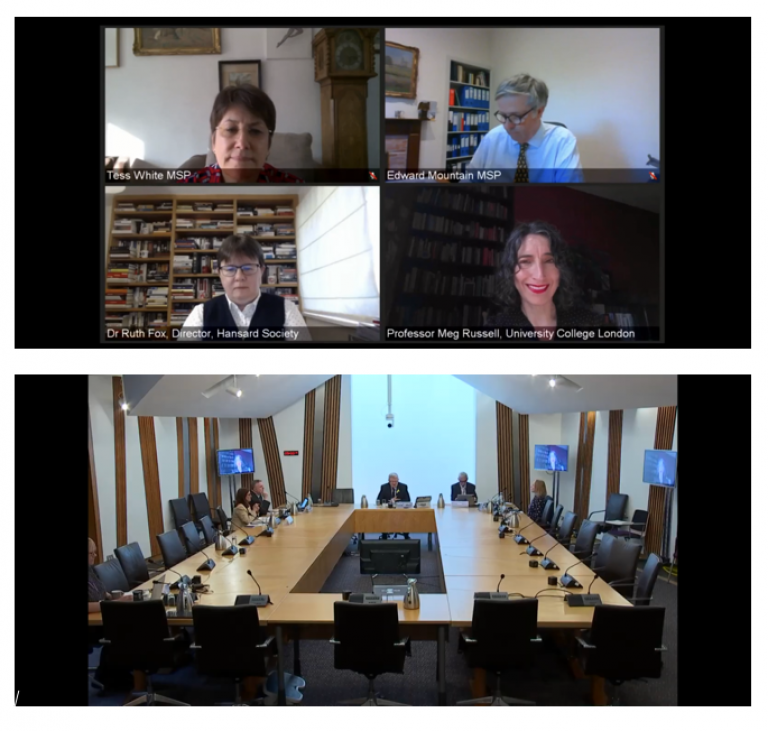Professor Meg Russell gives evidence to the Scottish Parliament
28 April 2022
Constitution Unit Director Professor Meg Russell has given evidence to the Standards, Procedures and Public Appointments Committee of the Scottish Parliament on the possible continued use of hybrid participation in parliament.

The Scottish Parliament’s Standards, Procedures and Public Appointments Committee is currently taking evidence on the options for continued ‘hybrid’ arrangements (i.e. a mixture of virtual and in-person participation) after the Covid-19 pandemic. On 21 April 2022, it took evidence from Unit Director Professor Meg Russell, alongside Dr Ruth Fox of the Hansard Society.
In her evidence, Meg cautioned against the indiscriminate use of long-term hybrid arrangements, highlighting risks to equal participation and the quality of parliamentary policy-making. In particular, she argued that online arrangements:
- Limit critical informal interactions outside the chamber, often essential to the legislative process;
- Inhibit the quality of debate by impeding non-verbal cues and spontaneous interventions;
- Could create a ‘second best’ form of political participation if virtual participation options are extended long-term, potentially disadvantaging those currently underrepresented in parliament.
Both witnesses argued that continued virtual arrangements should therefore be relied upon only where they apply to everybody equally, such as during a pandemic, or else in the case of temporary individual arrangements, such as illness or short-term parental leave.
Meg warned of the risks if some members participate only or mostly online, and some mostly in-person, which would see those present in-person benefiting from the informal interactions and negotiations which often happen spontaneously in and around parliament, while others participating virtually were excluded. This would be particularly undesirable if those participating remotely were from particular (perhaps already underrepresented) demographic groups.
Meg emphasised that the definition of ‘hybrid’ therefore matters: ‘everybody participating virtually some of the time’ is different, and less risky, than ‘some people participating online all of the time’. The latter could create a false picture of more diverse participation, if it brought members into formal participation but locked them out of essential informal interactions and decision making.
Finally, Meg warned of the further risks if innovative arrangements leave too much power in the hands of political parties. A situation where whips are casting large numbers of proxy votes, as happened in Westminster during the pandemic, should be avoided at all costs.
Key links:
- You can read the transcript of the session here
- Watch the evidence session in full.
- Read Professor Meg Russell’s analysis of remote representation here.
- Read a joint analysis by Meg Russell, Ruth Fox, Ronan Cormacain and Joe Tomlinson on the sidelining of the House of Commons during the pandemic here.
- Read more about similar themes from Professor Russell’s work on Brexit, Parliament and the Constitution here.
 Close
Close

